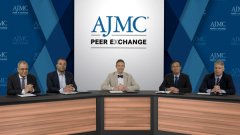
Patient Engagement and Clinical Pathways in HCC
Medical experts discuss patient considerations when utilizing clinical pathways in HCC treatment.
Episodes in this series

In this segment of the panel discussion, the focus shifts to the critical role of patients in the decision-making process, emphasizing the need for shared decision-making and the challenges involved in balancing patient autonomy with the expertise of health care providers. Ghassan Abou-Alfa, MD, MBA, stresses the importance of approaching patients with respect and ensuring that they understand the information provided, highlighting the ethical and moral responsibilities of health care professionals. The discussion also delves into the role of clinical pathways, with the panelists recognizing the significance of including patients in the decision-making process and educating them about the reasons behind specific treatment recommendations.
The conversation then transitions to the role of clinical pathways in health care resource utilization, with the discussion centering on the importance of understanding the impact and success of the implementation of these pathways. Salem acknowledges the complexity of measuring success and adherence, emphasizing the need to consider the diverse nature of health care providers and the varying requirements of different patient groups. The panelists discuss the challenges in creating pathways that cater to the individual needs of patients and stress the importance of considering factors beyond medication, such as social worker involvement and ancillary services, in ensuring effective patient care.
Throughout the segment, there is a strong emphasis on the need for personalized patient care and the challenges associated with implementing standardized clinical pathways. The panelists emphasize the necessity of recognizing the diverse needs of patients and tailoring care accordingly, considering the specific circumstances and requirements of each individual. The discussion highlights the critical role of health care providers in balancing the standardization of care with the individualized needs of patients, underscoring the importance of considering holistic approaches that extend beyond medication.
As the segment comes to a close, the speakers reiterate the importance of assessing the effectiveness of clinical pathways, emphasizing the need to measure the impact on patient outcomes and the overall success of the approach. They stress the significance of a comprehensive approach that incorporates various metrics and factors to ensure the delivery of optimal patient care. The segment concludes with a call to action for health care providers and stakeholders to consider the broader spectrum of patient needs and the diverse range of health care providers in order to develop more effective and inclusive clinical pathways that truly prioritize patient well-being.
Video synopsis is AI-generated and reviewed by AJMC editorial staff.
Newsletter
Stay ahead of policy, cost, and value—subscribe to AJMC for expert insights at the intersection of clinical care and health economics.










